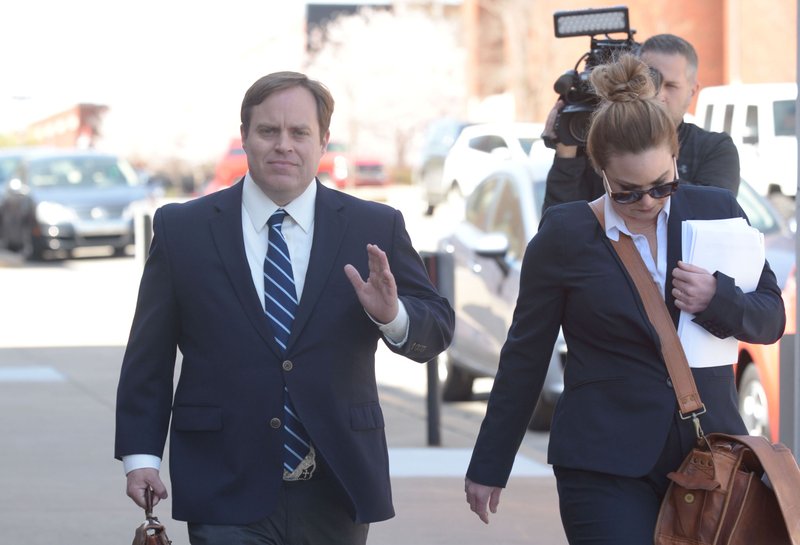2:30 p.m. update
FAYETTEVILLE — Potential witnesses during the corruption trial of former state Sen. Jon Woods include at least two of the state’s constitutional officers and several current and former legislators.
About 70 prospective jurors listened Monday morning as the list of possible witnesses was read at the federal courthouse.
Potential witnesses named so far include state Auditor Andrea Lea, state Treasurer Dennis Milligan and state Republican Party Chairman Doyle Webb.
Current and former lawmakers, some of whom directed Improvement Fund grants to the college, were also on the list. They include Sen. Bart Hester, R-Cave Springs; state Sen. Bryan King, R-Green Forest; state Rep. Bob Ballinger, R-Berryville; state Rep. Charlie Collins, R-Fayetteville; state Rep. Dan Douglas, R-Bentonville and former state Rep. Duncan Baird, R- Lowell, who is now with the state Department of Finance and Administration.
Ten current or former legislators directed state grants to Ecclesia College from 2013 through March 2015 totaling $617,500. The figure doesn’t include $100,000 the college received where records are unclear who gave the money.
Bentonville Mayor Bob McCaslin and West Fork Mayor Heith Caudle were also named as potential witnesses.
Read Tuesday's Arkansas Democrat-Gazette for full details.
10 a.m. update
FAYETTEVILLE — Jury selection began Monday morning in the corruption trial of former state Sen. Jon Woods.
Seventy prospective jurors have been called to the proceeding at the federal courthouse.
Woods, a Springdale resident; Oren Paris III, former president of Ecclesia College in Springdale; and consultant Randell G. Shelton Jr., formerly of Alma, were indicted in March 2017 by a grand jury on charges tied to an alleged kickback scheme.
Woods is accused of taking kickbacks from Paris in return for directing $550,000 in state General Improvement Fund grants to Ecclesia, all in 2013 or 2014. Paris disguised the kickbacks as consulting fees paid to Shelton who then passed the money along, the government contends.
Former state Rep. Micah Neal pleaded guilty to also receiving kickbacks from Paris and is expected to testify in the trial. Neal pleaded guilty Jan. 4, 2017, to one count of conspiracy. His sentence is pending.
Woods faces 15 counts of fraud, all relating to either wire or mail transfers of money. Paris and Shelton were named in 14 of the fraud charges. All three were charged with one count of conspiracy to commit fraud. Woods is also charged with one count of money laundering in connection with the purchase of a cashier's check.
Paris pleaded guilty Wednesday to one count of fraud, prompting Woods' attorney, Patrick Benca, to ask U.S. District Judge Timothy Brooks for a delay in the trial. Brooks denied the motion in a pretrial hearing later Wednesday but said he would consider written motions for delay later if the defense encounters problems it cannot overcome.
Paris has agreed to testify for the government against his former co-defendants. He pleaded guilty to transferring $50,000 of $200,000 in grant money from Woods and Neal to Shelton. Shelton sent $40,000 of the money to Woods as a kickback, according to Paris' plea.
Shelton disputes statements made by Paris in his plea, defense attorney Shelly Koehler of Fayetteville said after the pretrial hearing last week. The $50,000 was payment for consulting services rendered, she said. Testimony will show Shelton did the work he was paid to do, she said.
Benca also said Woods remains innocent of the charges and will prove it despite Paris' guilty plea.
The case involves grants from the state General Improvement Fund, which is controlled by legislators. The state Supreme Court declared the method of distribution unconstitutional in a ruling Oct. 5 of last year.
